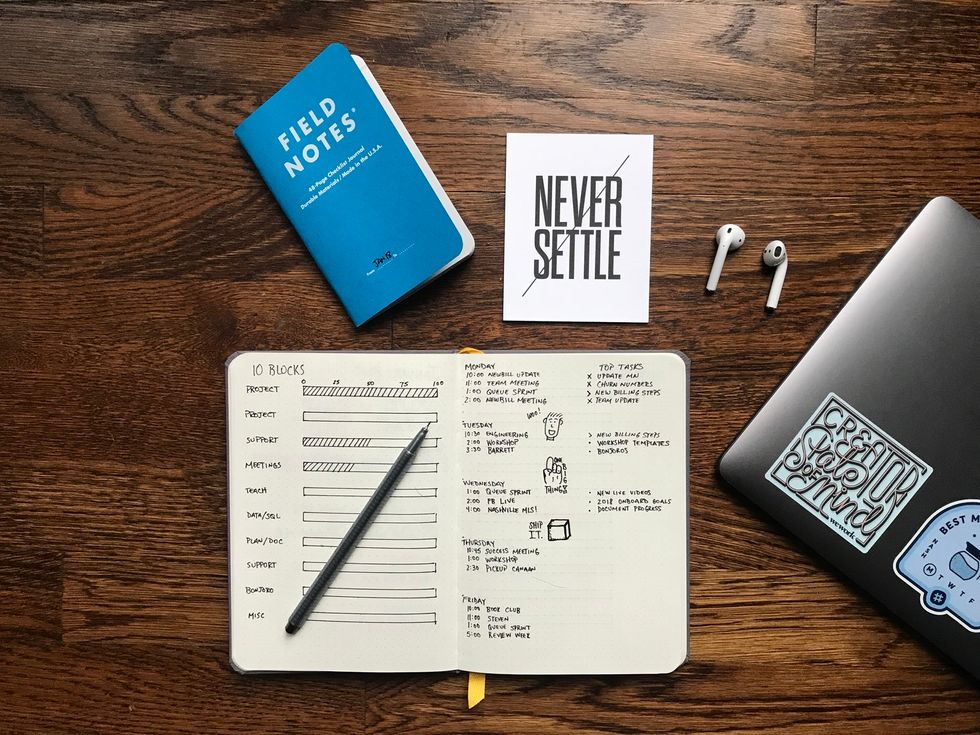4 Ways To Develop Grit And Conquer Your Goals
Tips to help you be the best you
The key to success isn't luck, talent, or a naturally high IQ. It's the dedication, perseverance, and consistency that you cultivate day in and day out. It's called grit. If you haven't watched the Grit TedTalk by Angela Lee Duckworth, you absolutely should - it's incredibly motivating. Duckworth explains that grit is the passion, stamina, and determination that you have toward long-term goals. Grit is getting out of bed instead of hitting snooze when your alarm goes off in the morning. Grit is staying at the library working on your essay instead of going out with your friends on a Friday night. Grit is pushing yourself to go to the gym instead of indulging in your favorite TV show after a long day. Here are some tips to increase your grit and achieve your goals.
1. Understand Instant Gratification

https://unsplash.com/photos/xsGxhtAsfSA
We live in a time where almost everyone is addicted to instant gratification. You might not want to admit it, but chances are, you're part of this majority. Do you binge on a Netflix marathon when you know you have homework due the next day? Do you indulge in a box of Girl Scout cookies when you know you should be eating something nutritious? Do you check Facebook during a lecture as soon as you get a notification when you know you should be paying attention? We all do these things and it's unreasonable to expect yourself to never watch Netflix, eat a cookie, or check social media. But it's important to combat instant gratification by developing delayed gratification. You should be able to resist temptations and focus on working toward your goals. You need to be able to tell yourself no. Do you really need to see who liked your latest Instagram picture? No. Do you really need to watch TV to de-stress? No. Do you really need to lay in bed for 30 minutes before getting out? No. It's difficult to say no to yourself, but it's crucial for developing grit.
2. Use Parkinson's Law To Your Advantage

https://unsplash.com/photos/mId2gG0a9GU
Parkinson's law is the concept that work expands to fill the time that you assign it. If you give yourself three hours to work on a project, you'll probably take three hours to complete it. But if you give yourself one hour to complete the project, you'll probably complete it with the same level of quality. I've definitely sat down to read a textbook chapter for what would probably take an hour, but I stretched it out to four hours because I chose to draw flowers in my notebook, online shop for colorful pens, and sort through all the papers in my backpack. I've learned that if you simply give yourself a shorter amount of time to complete a task, you'll do it more efficiently. It does require a certain level of self control. That might mean turning off your phone for a while or studying in the most boring, ugly section of the library. Getting more work done in a shorter amount of time will give you more time to do things that you enjoy. It will also force you to fully dedicate yourself to a goal - a key aspect of grit.
3. Find Your Flow State

https://unsplash.com/photos/fDsCIIGdw9g
Have you ever immersed yourself into a project so deeply that hours went by without you even realizing? I often find myself in this state of mind the night before a big exam or paper is due. I put all of my effort into my work - I don't know if I'm hungry, I forget about my problems at home, and I can't hear the noises around me. This state of complete concentration and focus is called the flow state. It was coined by Mihaly Csikszentmihalyi, a positive psychologist that studied the relationship between happiness and productivity. Working toward your goals is not always easy and enjoyable. Finding a state of flow can help you engage with your work on a deeper level. Meaningful work shouldn't feel like work. You might be wondering how to get yourself in this flow state. Csikszentmihalyi himself explains that the easiest way is to simply start and not stop. The first 20 to 30 minutes of working may not be fun, but after a while, your motivation will kick in and you'll find yourself in a state of flow. Immersing yourself in your work will help you find your passion and drive your grit.
4. Form Habits

https://unsplash.com/photos/f7fZg21B3ms
I recently read "The Power of Habit" by Charles Duhigg and I learned how crucial habits are for developing a successful work ethic. Duhigg explains that making your bed every single morning is highly correlated with increased productivity and wellbeing. A perfectly made bed probably won't get you a 4.0, but it can put you in the right mindset for a productive day. Hundreds of productive days will eventually lead to success. Small efforts accumulate into massive results. If your goal is to lose weight, form habits that will bolster that goal - meal prep healthy food every Sunday night or go to the gym after class three times a week. Whatever your goal may be, developing a set of habits will help you achieve it. It's difficult to force yourself to do something that you don't want to do, but the power of habit is that eventually, you'll want to do it. You'll develop the perseverance to keep going and that's exactly what grit is. Your grit will help you achieve anything that you want in life.
































